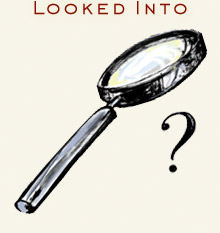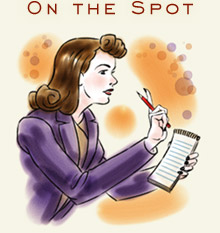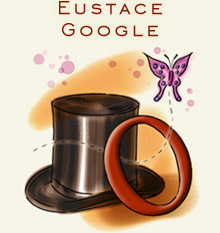Emdashes—Modern Times Between the Lines
The Basics:
About Emdashes | Email us
Ask the Librarians
Best of Emdashes: Hit Parade
A Web Comic: The Wavy Rule
Features & Columns:
Headline Shooter
On the Spot
Looked Into
Sempé Fi: Cover Art
Cherished and Cursed: Louis Menand and Stephen J. Whitfield Discuss Salinger's Catcher in the Rye
Filed under: Looked Into Tagged: books, interviews, J.D. Salinger, Louis Menand, MIT Press Journal, podcast, podcasts, Pollux, Stephen J. Whitfield, The New England Quarterly

Pollux writes:
“But how so transparently charming a novel can also exercise a peculiar allure and even emit disturbing danger signals may serve as an entrée into post-war American culture…” So writes Stephen J. Whitfield on his landmark commentary on Salinger’s The Catcher in the Rye.
Stephen J. Whitfield’s article for the December 1997 issue of the The New England Quarterly, called “Cherished and Cursed: Toward a Social History of The Catcher in the Rye,” is considered one of the Journal’s most popular articles.
And, in light of Salinger’s recent passing, Louis Menand will be interviewing Whitfield in a new podcast.
Read Whitfield’s fascinating article, listen to the podcast, and join the discussion today! (continued)
The Wavy Rule, a Daily Comic by Pollux: Punch and Judy and Neytiri
Filed under: The Wavy Rule Tagged: Avatar, cartoons, cinema, comics, James Cameron, Pollux, puppet, The Wavy Rule

Click on the image for a detailed view! (continued)
The Wavy Rule, a Daily Comic by Pollux: Caveat Emptor
Filed under: The Wavy Rule Tagged: advertising, cartoons, comics, history, Pollux, Roman Empire, The Wavy Rule

Click on the image for a detailed view! (continued)
Beat That: James Wood Investigates David Foster Wallace at the 92nd St. Y
Filed under: On the Spot Tagged: David Foster Wallace, Frank Rich, James Wood, Jane Mayer, John Krasinski

Martin Schneider writes:
There is a fantastic event coming up at the 92nd Street Y this month—New Yorker literary critic James Wood does a "First Read" of David Foster Wallace's adventurous, uneven, maddening, delightful, never-boring short story collection Brief Interviews with Hideous Men. The event is on Monday, March 22, at 8:15pm, and has a hipster-friendly pricing policy: $19 admission, but only $10 for those 35 and younger (ID will be checked, people, so no funny business).
I had the great pleasure of seeing Wood speak at the 2008 New Yorker Festival, and his intelligence, gentleness, and patience were extraordinary. As a longtime fan of Wallace, I'm genuinely excited to hear what (continued)
Eustace Tilley Squared -- If You Know Where to Look
Filed under: Eustace Google Tagged: Adam Kempa, Ben Bass, Eustace Tilley, Francoise Mouly, Pollux

Martin Schneider writes:
As Pollux noted recently—and our friend Ben Bass posted too—there is a mind-blowing trick in the special four-Eustace 85th anniversary cover of last month. If you place the four covers in the proper two-by-two configuration, the outlines of the original classic Eustace cover can be discerned.
Now we have Adam Kempa's excellent slider application, which allows you to find it without spreading (multiple copies of) the issue all over your living room floor.
I am endlessly impressed by such cleverness! Françoise Mouly, hats off to you! (A top hat, of course.) (continued)
Q: Where Is the U.S.'s Largest Abandoned Subway Tunnel?
Filed under: Looked Into Tagged: Bill McKibben, Brooklyn, Cincinnati, Jonathan Taylor, Patricia Marx, subways

A: Jonathan Taylor writes:
I was pained by Patricia Marx’s shopping column on Brooklyn in the March 8 issue, but she was correct to highlight the thrilling tours of the Atlantic Avenue Tunnel (also the subject of a 1982 Talk piece by Bill McKibben).
But that didn’t prepare me for these pictures from a tour of Cincinnati’s never-completed subway (via Lawyers, Guns & Money)—they’re a must see. (continued)
The Wavy Rule, a Daily Comic by Pollux: Drummer Boy
Filed under: The Wavy Rule Tagged: cartoons, comics, drum, Fox, Pollux, The Wavy Rule

Click on the image for a detailed view! (continued)
The Wavy Rule, a Daily Comic by Pollux: Oscar the Grouch
Filed under: The Wavy Rule Tagged: cartoons, cinema, comics, Oscar, Oscars, Pollux, The Wavy Rule

Click on the image for a detailed view! (continued)
Only in The New Yorker, Kids: The Tale of the Cunning Tailor
Filed under: Little Words Tagged: Amy Davidson, Close Read, Guantanamo, Jonathan Taylor, Rahm Emanuel
Jonathan Taylor writes:
At Close Read, Amy Davidson has the last word on the tall crop of Rahm Emanuel tales being told at various firesides:
Would the President's advisers really take pride in striking a deal to open a new Guantánamo? It's the sort of bargain a clever tailor in a fairy tale proposes to a bad elf.(continued)
Number of Appearances by The New Yorker in Harper's Index: 2
Filed under: Looked Into Tagged: Craig Seligman, Harper's Index, Jonathan Taylor, Luc Sante, Matthew Yglesias, Melvyn Bragg, Paul Krugman, Peter Hessler, radio, Spencer Ackerman, St. Clair McKelway, Will Self, WNYC

Jonathan Taylor writes:
- Via the neatly searchable archive of the Harper's Index, they are:
(Jan. 1993) Percentage of New Yorker articles since Tina Brown became editor whose first sentence includes a person's name: 70
(July 1996) Chances that a cartoon in The New Yorker's Women's Issue was drawn by a man: 5 in 6 - In the Times Book Review, Craig Seligman shares some (self-) revealing recollections of St. Clair McKelway, on the occasion of a new collection of McKelway's New Yorker reporting.
- At the Edge of the American West, a historian's reflection on Paul Krugman's comments about studying economics versus studying history in the recent New Yorker Profile of him—with some spirited exchanges in the comments. Coincidentally, "Undercover Economist" Tim Harford's latest column in the Financial Times illustrates the persistence of long-ago history in contemporary outcomes.
- Continuing on the history tangent, I was delighted to see Adam Cohen's Times Editorial Observer appreciation of the BBC Radio 4 program (and podcast) "In Our Time," in which Melvyn Bragg harries his academic guests into distilling great topics in civilization into their pithiest essence. (Will Self also wrote about "In Our Time" recently in the London Review of Books.) WNYC's Laura Walker wrote a letter to the Times defending U.S. radio against the suggestion that it doesn't host such erudite discussions. But Walker's counterexamples are telling: All the topics are basically contemporary; none represents the undiluted interest in the past that "In Our Time" exhibits.
- I reviewed Country Driving, by Emdashes fave Peter Hessler, at Bookforum.com.






